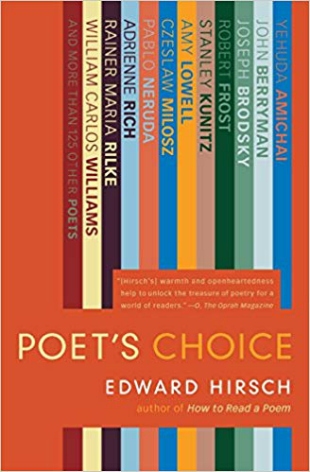Edward Hirsch is the author of six books of poems and three books of prose, among them the national bestseller How to Read a Poem: And Fall in Love with Poetry. He has received the National Book Critics Circle Award, the Prix de Rome, and a MacArthur Fellowship, and he is president of the John Simon Guggenheim Memorial Foundation. In early 2002, Hirsch began writing a weekly column, "Poet's Choice," in the Washington Poet Book World. In the introduction to this revised and expanded collection of his columns, he notes:
"Poetry is a means of exchange, a form of reciprocity, a magic to be shared, a gift. There has never been a civilization without it. That's why I consider poetry — which is, after all, created out of a mouthful of air — a human fundamental, like music. It saves something precious in the world from vanishing. It sacramentalizes experience. It is an imaginative act that starts with the breath itself. It arises from breathing. It is a living thing that comes from the body, from the heart, from the heart and lungs, and this seems hardwired into us. It enters our bodies through the material stream of language. It moves and dances between speech and song. These words rhythmically strung together, these electrically charged sounds, are one of the ways we come to know ourselves. A poem beats out time."
Hirsch believes that poetry puts us in touch with ourselves and enables us to grapple with death, suffering, and loss. Hirsch is convinced that poetry is always concerned with the search for meaning and the communal act where one shares intimacies with another. This example is by Palestinian Taha Muhammad Ali:
"And so
it has taken me
all of sixty years
to understand
that water is the finest drink,
and bread the most delicious food,
and that art is worthless
unless it plants
a measure of splendor in people's hearts."
And here is a poem by Czeslaw Milosz titled "Gift:"
"A day so happy.
Fog lifted early, I worked in the garden.
Hummingbirds were stopping over honeysuckle flowers.
There was no thing on earth I wanted to possess.
I knew no one worth my envying him.
Whatever evil I had suffered, I forgot.
To think that once I was the same man did not embarrass me.
In my body I felt no pain.
When straightening up, I saw the blue sea and sails."
Hirsch provides a rich and enlightening overview of more than 130 poets from all times and from around the world. He says of Naomi Shihab Nye that she holds to the view that "lyric poetry nourishes intimacy and fosters understanding, that human conditions are more powerful and enduring than cultural differences." He salutes Muriel Rukeyser's blending of the personal and the political and calls Gary Snyder's poems, "prayers that attend to our fluent natures." Hirsch dazzles with assessments of Octavio Paz, Primo Levi, Kathleen Raine, Pablo Neruda. and many more men and women who have eloquently spoken to our disquieting condition.
